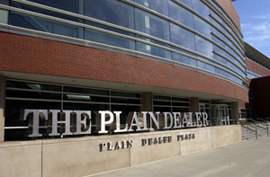The Paper and the Orchestra

Cleveland
Plain Dealer
building
© Cleveland
Plain Dealer
The Plain Dealer was an institution in Cleveland. So was the Cleveland Orchestra. The newspaper was founded in 1842, went out of business in 1865, and was resuscitated in 1877. Over the next century, it went through a series of owners until, in 1967, Advance Publications (part of the publishing empire of S. I. Newhouse) acquired it. The 21 st -century woes of the newspaper industry hit the Plain Dealer hard with declining revenues and dwindling subscriptions. In 2006, it offered buyouts to one-fifth of the staff.
But it continued to serve the community as best it could. Over the years, the paper had won numerous regional and national awards, among them the 2005 Pulitzer Prize in Commentary and several awards from the American Association of Sunday and Feature Editors and the Associated Press . In 2003, the newspaper trade publication Editor and Publisher named Editor Douglas Clifton “Editor of the Year.” In 2007, the paper had a total daily circulation of 334,195.
Clifton served as editor from 1999 to 2007. When he retired, the paper appointed Susan Goldberg, executive editor and vice president of the San Jose (CA) Mercury News , to replace him. Goldberg had previously worked in reporting or management positions at USA Today , the Detroit Free Press and the Seattle Post-Intelligencer . She took over on May 29, 2007.
The orchestra was not as old as the newspaper—founded only in 1918. But it was just as important to the community. The orchestra lived in the famed art-deco (with heavy classical influence) Severance Hall, built especially for the ensemble in 1931. It rose in prominence to become one of the top orchestras in America, along with such institutions as the Philadelphia Orchestra, the Boston Symphony, and the Chicago Symphony.
Its best-known, and longest serving, conductor was George Szell (1946–1970). Under Szell, the orchestra undertook an ambitious touring and recording program which brought its music to dozens of cities and into millions of homes. Lorin Maazel spent 10 years at the helm (1972–1982), and was succeeded in 1984 by Dohnányi, who served 18 years until 2002, when Welser-Möst took over. Cleveland’s music fans adored the orchestra, even seeking autographs after performances. In the summer, the orchestra moved operations to Cuyahoga Falls, Ohio, and the Blossom Music Center.
Over the decades, the newspaper faithfully followed the Cleveland Orchestra with both news stories and music criticism. Cleveland Plain Dealer readers were fortunate that the paper invested in a music critic, a luxury not every newspaper could afford. But at the Plain Dealer , it was considered a worthy expense. Rosenberg was only the latest in a long line of music critics who spent many hours at Severance Hall. But by 2007, some of his editors were starting to question whether Rosenberg should remain in that post.